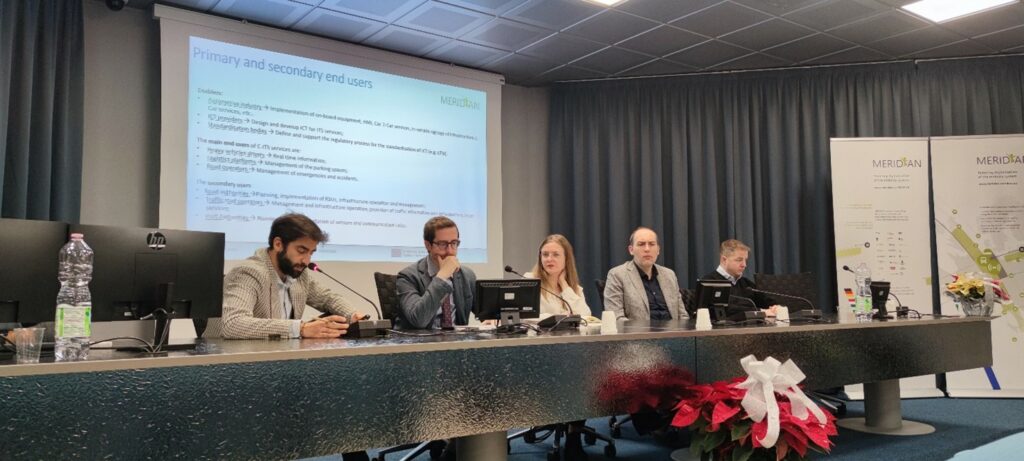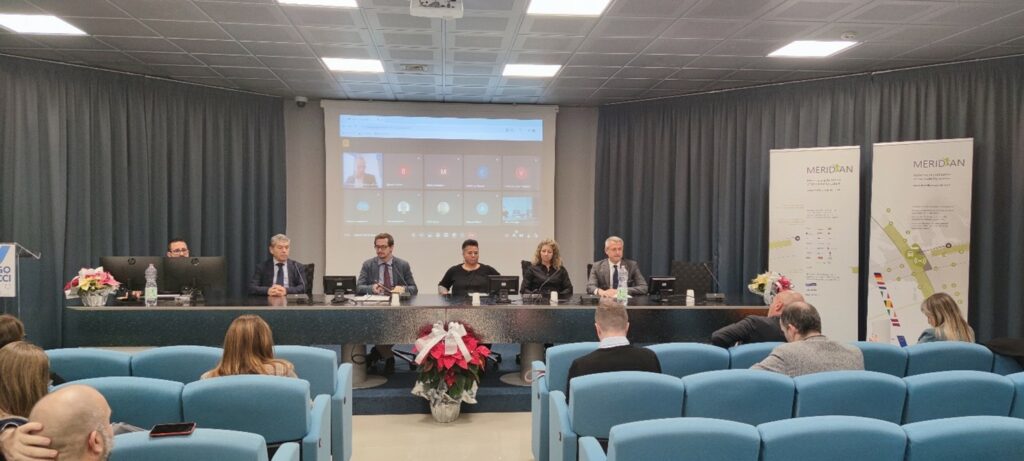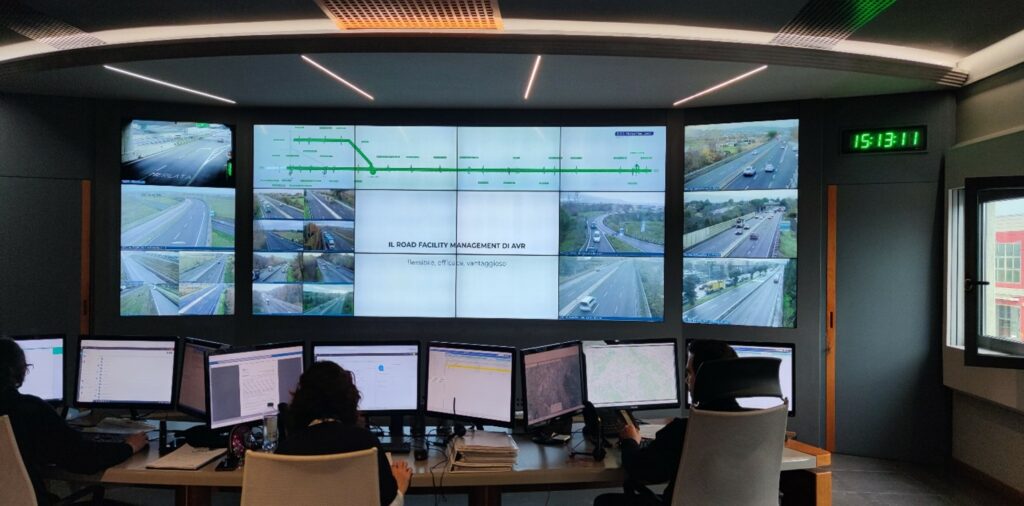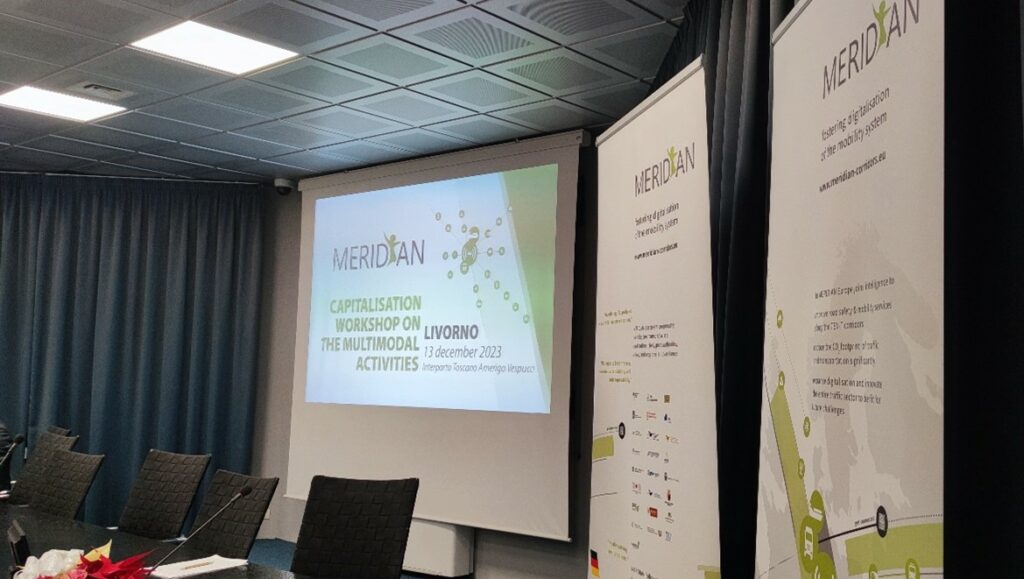On 13 December 2023, the MERIDIAN capitalisation workshop with a focus on multimodal activities was held in Livorno at the Interporto Toscano Amerigo Vespucci, organized jointly by SINA, the port authority of the northern Tyrrhenian Sea (Port of Livorno) and the port authority of the northern Adriatic Sea (Port of Ravenna). The event, held in hybrid mode with around 30 participants in the room and online, also coincided with the first knowledge building workshop.
The event began at 9am with a warm welcome from Giampiero Costagli of the Port Authority of Livorno, and then gave the words to Port of Ravenna for the introduction of the event.
Francesco Magagnoli introduced the objectives of the workshop and the structure of future events with at least two more workshops (one in spring and one in winter 2024) and 2 questionnaires with feedback on the activities with the common objective of evaluating the success of the multimodal tasks. This first workshop was divided into two parts, with a first part dedicated to multimodal activities with particular attention to the transition and best practices learned between Ursa Major Neo and MERIDIAN. During this session the four ports, partners of the MERIDIAN project, and the ZAI consortium presented their projects.
Margit Kuuse and Stefano Terribile from the port of Ravenna exposed the projects carried out in Ursa Major Neo and the lessons learned and what to improve, they then presented the projects underway in MERIDIAN and any future applications of a new project proposal.
Following this, Ivano Toni from the port of Livorno presented the existing projects in MERIDIAN and what they have learned from previous projects, such as environmental problems relating to pollution and how to mitigate them.
Alberto Cozzi from the port of Trieste and Simone Pacciardi from the port of La Spezia presented the solutions proposed to optimize travel to and from the respective port authorities, such as the management of advance authorizations for heavy vehicles to enter.
Finally, Alberto Milotti presented the technological innovations implemented at the Verona interport.
After the break, the technical interventions were presented starting from Micheal Trees of the Ministry of Baden -Wurttemberg who presented the project of a mobility data integration platform to cope with the large amount of data that are necessary to make a system work multimodal. The platform will have the ambition of acting as a monitoring center for 45 tunnels as well as monitoring intelligent transport systems to improve transport safety and efficiency.
Following this, Edwin Van Hassel of the University of Antwerp presented the Frontier project, which is not linked to the MERIDIAN project. The University of Antwerp is developing logistics simulation models to evaluate the impact of different freight transport supply and demand management strategies, as well as a decision support approach to resolve conflicts between different stakeholders. Despite not being a partner of the project, the presentation of this project was extremely interesting for the objective of the event.
Ilaria de Biasi from the Brenner Motorway then presented an overview of the multimodal activities underway in MERIDIAN, such as the activities of the BrennerLEC project for the installation of low-cost sensors together with Austria and Bavaria.
Following this, Mr. Cioni from the Tuscan interport illustrated the complexities of managing the interport and multimodal exchanges and the solutions proposed to optimize the efficiency of the exchange systems between the various multimodal transports.
As the penultimate intervention, the project for the port of Livorno in Ursa Major Neo was presented with the related lessons learned to optimize vehicle routes and planned access to and from the port and how these activities have optimized road safety.
The last intervention by AVR Group introduced the activities of AVR, i.e. the company that manages the control room that manages the main road (S.G.C. in Italian) Florence-Pisa-Livorno, which was visited in afternoon.
After lunch, in the afternoon the participants moved to Empoli, about 30 minutes from Livorno, to visit the radio room that manages the S.G.C. FI-PI-LI. This route is in fact one of the most important arteries of the road system of the Tuscany Region, it crosses the central-northern area directly connecting the cities of Florence, Pisa (passing the airport) and Livorno (entering directly into the port) and the related provincial territories. The artery branches out for approximately 100 km with separate double-lane carriageways for each direction of travel, including 30 junctions and approximately 200 works of art including bridges, viaducts, overpasses and tunnels. The artery is at the center of the intermodal transport system since, in addition to acting as a car connection between the above-mentioned locations, it also crosses the Navicelli canal (the outlet of the Pisan shipbuilding industry on the Tyrrhenian Sea), managing the mobile bridges intersecting with it in a such as to guarantee and optimize the passage of vehicles heading towards the port and of vessels entering/exiting the shipyards. The radio room with dedicated operators provides assistance to each traveler of the FI-PI-LI, collects, analyzes and disseminates information on traffic and road conditions, provides assistance to the intervention of the traffic police and emergency vehicles, monitors the situation of the construction sites in course and environmental conditions to guarantee the safety and practicability of the road.




